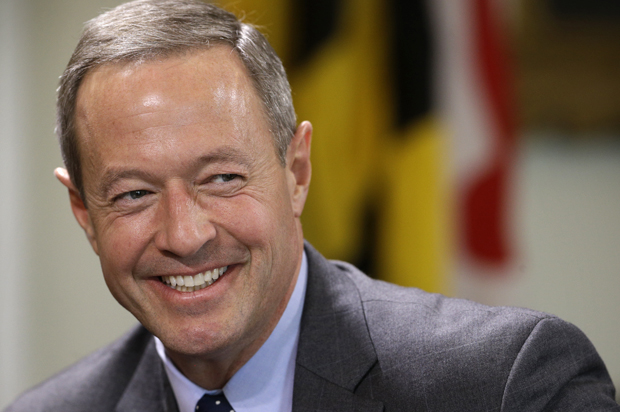Former Baltimore mayor and Maryland governor Martin O’Malley, at long last, is declaring the presidential campaign that he’s been steadily mapping out since he was approximately four years old. He’ll host a kickoff event in Baltimore on Saturday and then head straight to Iowa and New Hampshire.
The same Iowa and New Hampshire that he’s already visited some 10 million times in the last year, where he has staffers, where he’s been working harder than anyone else in the Democratic field. He’s done the Sunday morning shows and won… let’s called it “mixed”… attention during the Baltimore riots. He has a big media booster in Matt Drudge, who according to Mark Halperin decides all elections. Drudge enjoys posting shirtless photos of O’Malley on his website.
And where has all this gotten him? The RealClearPolitics national polling average shows him earning 0.8 percent of Democratic voters. That puts him behind all the declared and prospective candidates, including meandering hobos like Jim Webb and Lincoln Chafee. He fares slightly better in Iowa, with a hearty 2.4 percent, and New Hampshire, where he’s at 2.8 percent.
We are not trying to be mean to Martin O’Malley. Just wondering what he’s doing, you know? Because he’s really stretching the standard playbook here for “testing the waters.” To test the waters for a presidential run is to visit early states and make media appearances and determine if there’s enough support out there to make the run worth it. The answer to that, in bold red blinking letters, appears to be “NO.”
It’s not his fault. There’s just not that much space for him. Hillary Clinton has locked up support from most of the Democratic Party — its officials, and also its voters. All the pundits who criticize her campaign as inept or strategically aimless thus far haven’t been paying much attention. On the issues where she’s staked out policy positions — immigration reform, police and sentencing reform, combating the heroin epidemic — she’s impressed, flattered even, the advocacy groups pushing those issues to the fore. In other words: she’s a mainstream Democratic politician successfully absorbing the space to her left. Martin O’Malley is another mainstream Democratic politician who wanted to absorb the space to Hillary Clinton’s left, but he’s being crowded out. There’s room for a genuine outsider — as in, a figure who’s spent his life outside the Democratic mainstream — to run a campaign to Clinton’s left. And Bernie Sanders has snatched up that role.
So what is O’Malley’s goal?
There’s always the possibility that VHS footage of Hillary Clinton murdering Vince Foster and tons of other people in the ’90s emerges, she drops out, and Martin O’Malley sort of “swoops in” to the frontrunner status. (Of course if Hillary Clinton did drop out, or completely crater, you’d likely see Joe Biden or Elizabeth Warren get in.)
But there’s another, more obvious rationale, and one that makes a decent amount of sense. Martin O’Malley is only 52 years old, and the Democratic nomination for president will be vacant again in either 2020 or 2024. That might be what he’s really looking at.
Right now O’Malley is suffering for two reasons: lack of identifiable space within the field, and lack of name recognition. There’s nothing he can do about the former. But running for president, even if you can’t win, is a great way to build name recognition for down the road.
His efforts to become a broadly known figure thus far haven’t worked too well. The best way to improve that is to get on a debate stage with Hillary Clinton six times and show off an understanding of policy. If she wins the presidency, he can take a job in her administration and run again in 2024; if she loses, he can return to Iowa on Wednesday, Nov. 9, 2016, and get to work setting up an infrastructure — and then he’ll be a known commodity.

